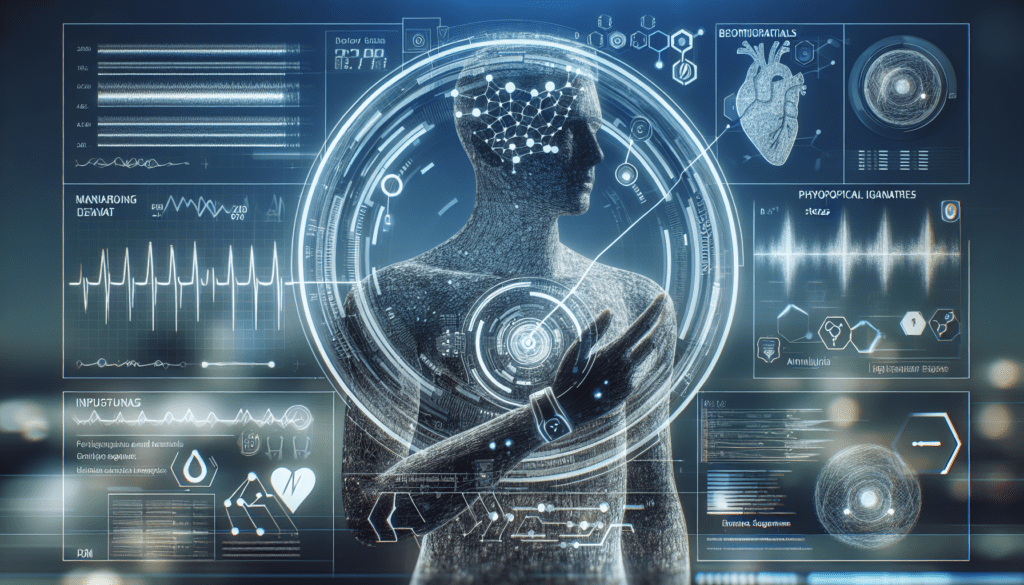Imagine having a personal assistant that can anticipate when you’re feeling overwhelmed and offer assistance to alleviate your stress. Thanks to the evolution of wearable technology and artificial intelligence (AI), this concept is no longer far-fetched. The innovative field of stress detection using AI wearables is revolutionizing the way we manage our mental wellbeing. By monitoring biometric data and analyzing patterns, these wearable devices can accurately detect stress levels and provide personalized recommendations for relaxation techniques and stress reduction. Say goodbye to guesswork and hello to a happier, healthier you with stress detection using AI wearables.

Overview
In today’s fast-paced and demanding world, stress has become an inevitable part of our lives. It affects our mental and physical well-being, and if left unmanaged, can lead to serious health issues. However, advancements in technology have paved the way for innovative solutions to help us better cope with stress. One such solution is AI wearables, which are equipped with artificial intelligence to detect and manage stress. In this article, we will explore the concept of stress, the role of AI in wearables, how AI detects stress, the benefits of AI-based stress detection, data collection in AI wearables, machine learning algorithms used in stress detection, the accuracy of stress detection, and the various applications of stress detection.
Understanding Stress
Definition of stress
Stress is a natural reaction of the body and mind to any demand or pressure placed upon it. It is the body’s way of responding to a perceived threat or challenge. Stress can be triggered by various factors such as work demands, personal relationships, financial pressures, and health concerns. It often manifests as emotional, mental, and physical symptoms, impacting our overall well-being.
Causes of stress
Stress can arise from a multitude of sources in our daily lives. Common causes of stress include work-related pressures, family problems, financial difficulties, major life events, and health issues. Each individual may have different stress triggers, and it is important to identify and address these underlying causes in order to effectively manage stress.
Effects of stress
Stress can have a profound impact on our physical and mental health. It can lead to symptoms such as headaches, muscle tension, fatigue, sleep disturbances, irritability, anxiety, and depression. Prolonged exposure to stress can increase the risk of chronic health conditions such as heart disease, diabetes, and immune system disorders. Therefore, it is essential to recognize and manage stress in order to maintain a healthy and balanced life.
Wearable Technology
Introduction to wearables
Wearable technology refers to devices that can be worn on the body, typically in the form of accessories or clothing. These devices are equipped with various sensors and technologies to collect and monitor data about the user’s health and fitness. Wearables have gained popularity due to their ability to track physical activity, heart rate, sleep patterns, and more. They provide valuable insights into our daily routines and behavior, helping us make informed decisions about our health and well-being.
Types of wearables
There are several types of wearables available in the market today. Fitness trackers, smartwatches, smart clothing, and health monitoring devices are some examples. Fitness trackers are designed to track activities such as steps taken, calories burned, and distance covered. Smartwatches offer additional features like notifications, music control, and GPS tracking. Smart clothing incorporates sensors into the fabric, enabling the collection of physiological data such as heart rate, body temperature, and respiration rate. Health monitoring devices, on the other hand, are specialized wearables that focus on specific health conditions or medical needs, such as glucose monitors for diabetics or ECG monitors for heart patients.
AI in Wearables
Role of AI in wearables
Artificial intelligence (AI) plays a crucial role in enhancing the capabilities of wearables. AI algorithms enable wearables to process, analyze, and interpret the vast amounts of data collected from the sensors. This allows wearables to provide personalized insights and recommendations based on the user’s individual needs and goals. By leveraging AI, wearables can go beyond simple data tracking and provide valuable interventions and support to manage stress and improve overall well-being.
Benefits of AI in wearables
The integration of AI in wearables offers several benefits. Firstly, it enables real-time monitoring and analysis of various physiological and behavioral factors, allowing for more accurate and context-aware stress detection. Additionally, AI algorithms can identify patterns and trends in the data, leading to personalized insights and recommendations. This empowers individuals to take proactive steps towards managing their stress levels. Moreover, the advanced capabilities of AI allow wearables to continuously learn and adapt to the user’s unique needs, ensuring a more personalized and effective stress management experience.
Stress Detection
Traditional methods
Stress detection has traditionally relied on subjective self-reporting or physiological measurements performed in clinical settings. Self-reporting involves individuals reflecting on their own stress levels, which can be subjective and prone to biases. Physiological measurements, such as measuring heart rate or skin conductance, provide objective data but are often limited to controlled environments and require specialized equipment and expertise.
Limitations of traditional methods
The traditional methods of stress detection have several limitations. Self-reporting is based on memory and perception, which may not accurately reflect an individual’s true stress levels. Physiological measurements, although objective, may not capture the nuances and contextual factors that contribute to stress. Furthermore, these methods are often time-consuming, require expert interpretation, and do not provide real-time feedback or interventions to manage stress effectively.
AI-Based Stress Detection
How AI detects stress
AI-based stress detection in wearables harnesses the power of machine learning algorithms to analyze vast amounts of data collected from various sensors on the device. These algorithms can identify patterns and anomalies in the data, enabling the detection of physiological and behavioral markers of stress. By training on large datasets, AI algorithms can learn to recognize individual patterns and provide personalized stress detection and management support.
Advantages of AI-based stress detection
AI-based stress detection offers several advantages over traditional methods. Firstly, it provides real-time and continuous stress monitoring, allowing individuals to be aware of their stress levels and take immediate action. AI algorithms can also take into account contextual factors such as time of day, location, and activity level, providing more accurate and context-aware stress detection. Additionally, AI-based wearables can provide personalized interventions such as guided breathing exercises, mindfulness techniques, or stress-reducing suggestions tailored to the individual’s unique needs.
Data Collection
Sensors in AI wearables
AI wearables are equipped with a variety of sensors to collect data about the user’s physiological and behavioral states. Common sensors include accelerometers for detecting movement and activity levels, optical heart rate sensors for monitoring heart rate, electrodermal activity sensors for measuring skin conductance, and temperature sensors for tracking changes in body temperature. These sensors work together to provide a comprehensive picture of the user’s stress levels and overall well-being.
Types of data collected
The sensors in AI wearables collect a wide range of data related to stress and well-being. This includes physiological data such as heart rate, heart rate variability, respiration rate, skin conductance, and body temperature. Behavioral data such as activity levels, sleep patterns, and social interactions are also captured. By analyzing and correlating this multi-modal data, AI algorithms can gain valuable insights into an individual’s stress levels and help manage them effectively.
Machine Learning Algorithms
Training the algorithms
Machine learning algorithms in AI wearables are trained using large datasets that consist of annotated stress data. These datasets are created by collecting data from individuals in various stress-inducing situations and labeling the data according to stress levels. The algorithms learn to recognize patterns and associations between the collected data and the annotated stress levels, allowing them to accurately predict stress in real-time.
Popular machine learning algorithms
There are several machine learning algorithms that are commonly used in AI-based stress detection. Support Vector Machines (SVM), Random Forests, Convolutional Neural Networks (CNN), and Long Short-Term Memory (LSTM) networks are some examples. These algorithms excel at processing large amounts of data, identifying complex patterns, and making accurate predictions. By leveraging the power of these algorithms, AI wearables can provide reliable and effective stress detection capabilities.
Accuracy of Stress Detection
Evaluating accuracy
The accuracy of stress detection in AI wearables is typically evaluated by comparing the algorithm’s predictions with ground truth data. This can be done through controlled studies where individuals are exposed to stress-inducing situations while wearing the device. The collected data is then compared to the participants’ self-reported stress levels or physiological measurements taken in parallel. By analyzing the correlation between the predicted and actual stress levels, the accuracy of the algorithm can be determined.
Improving accuracy
To improve the accuracy of stress detection, ongoing calibration and refinement of the AI algorithms are necessary. This can be achieved by continuously collecting labeled data from a diverse range of individuals and stress-inducing scenarios. The algorithms can then be updated and fine-tuned based on this new data, ensuring that they remain effective and accurate across different contexts and individuals.
Applications of Stress Detection
Healthcare
Stress detection using AI wearables has significant implications for healthcare. It enables the early detection and prevention of stress-related conditions such as anxiety disorders and depression. Healthcare providers can use the collected data to gain insights into patients’ stress levels and tailor treatment plans accordingly. AI wearables can also be integrated into telemedicine platforms, allowing remote monitoring and support for individuals undergoing stress management therapies.
Workplace
Stress is a common issue in the workplace, affecting productivity, job satisfaction, and overall well-being. AI wearables can help employees and employers identify and manage stress in real-time. By providing personalized interventions and recommendations, these devices can support individuals in maintaining optimal stress levels and improving their work performance. Employers can also leverage the aggregated data from wearables to assess and improve the overall well-being and stress levels of their workforce.
Personal well-being
AI-based stress detection in wearables empowers individuals to take charge of their own well-being. By providing real-time feedback and interventions, these devices can help individuals develop healthy coping mechanisms and reduce their stress levels. Additionally, wearables can integrate with other wellness apps and platforms, enabling individuals to track their progress, set goals, and receive personalized insights and recommendations for stress management.
In conclusion, AI wearables have the potential to revolutionize stress detection and management. By leveraging the power of AI algorithms and advanced sensor technologies, these devices can provide personalized and real-time monitoring of stress levels. The accuracy and effectiveness of AI-based stress detection are constantly improving, paving the way for a future where individuals can proactively manage their stress and live healthier and more balanced lives.
